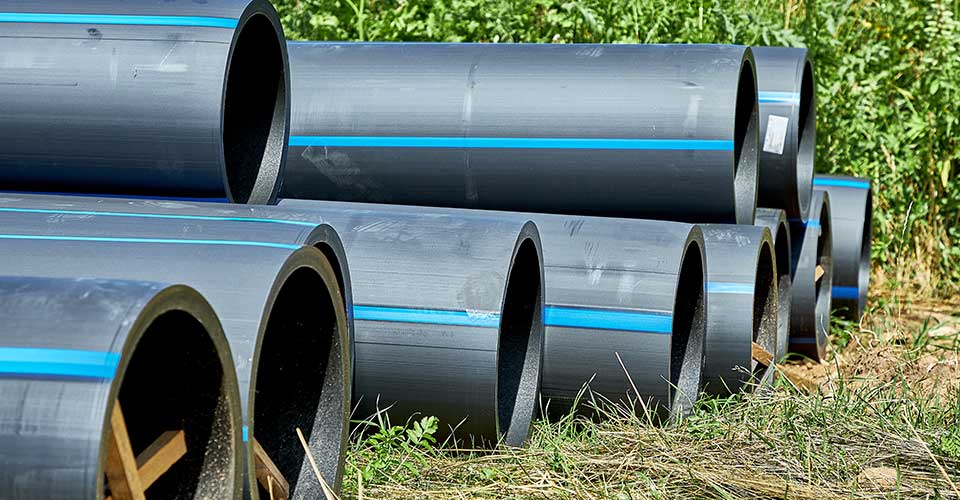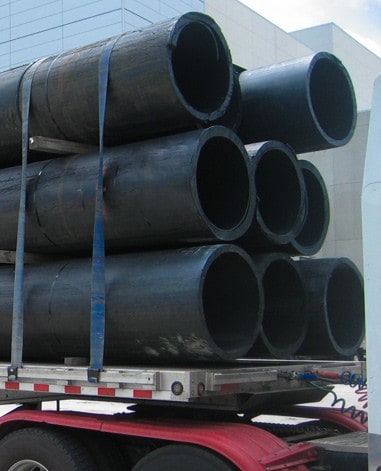Pipe Manufacturing Midland TX: From Raw Material to Finished Pipe
A Comprehensive Overview to the Different Uses HDPE Pipeline in Building and Industry
HDPE pipelines have actually become a pivotal part in modern construction and industrial applications. Their special buildings, such as resistance to deterioration and lightweight style, make them ideal for a vast array of usages. From water systems to farming watering, HDPE pipes offer services that enhance efficiency and sustainability. Comprehending their varied applications is vital for professionals seeking to maximize infrastructure. What particular advantages do these pipes offer each field?
Water System and Distribution Equipments
Water supply and distribution systems are crucial parts of metropolitan infrastructure, typically relying on high-density polyethylene (HDPE) pipelines for their resilience and performance. These systems transportation drinkable water from treatment centers to consumers, ensuring ease of access and safety and security. HDPE pipelines are favored for their resistance to deterioration, chemicals, and severe temperature levels, which enhances their longevity and lowers upkeep expenses. In addition, their lightweight nature allows for much easier setup and transport, making them suitable for different urban and country applications.
The versatility of HDPE pipes allows them to be mounted in tight spaces and around obstacles, decreasing the demand for substantial excavation (American Plastics HDPE Pipe Manufacturing). Their smooth indoor surface decreases friction losses, boosting water circulation prices. As cities proceed to expand, the demand for reputable water systems increases, placing HDPE pipes as a lasting remedy for contemporary framework projects. Their proven record makes them a preferred selection among engineers and metropolitan planners alike
Wastewater Administration and Treatment
Reliable wastewater administration and therapy are essential for preserving public health and ecological high quality. HDPE pipelines play an essential role in this procedure because of their toughness, resistance to corrosion, and capacity to stand up to severe chemicals. These pipes are commonly used in various applications, consisting of sewage systems, stormwater water drainage, and wastewater treatment facilities. Their lightweight nature assists in much easier installment and transport, minimizing labor expenses and time.
Additionally, HDPE pipes have a smooth interior surface that minimizes friction loss, advertising efficient flow rates. They are likewise much less prone to leaks and failures compared to traditional products, making certain that impurities are had efficiently. Their flexibility enables for adaptability in different soil conditions, making them suitable for diverse ecological setups. As markets progressively prioritize lasting techniques, making use of HDPE pipes in wastewater management systems lines up with goals for lowering environmental impact and improving source healing.
Agricultural Watering Solutions
In farming settings, effective irrigation remedies are vital for optimizing plant returns and managing water sources. HDPE (High-Density Polyethylene) pipes play a vital function in contemporary watering systems due to their durability, adaptability, and resistance to deterioration. Their capacity to withstand high stress makes them ideal for both surface area and subsurface watering applications, making sure consistent water distribution across fields.
Farmers can use HDPE pipelines in drip watering systems, which supply water straight to plant origins, minimizing wastefulness and advertising healthy development. In addition, these pipes are light-weight and simple to set up, lowering labor expenses and installment time. Their long life-span and reduced maintenance demands even more boost their allure in agricultural practices.
HDPE pipes are environmentally pleasant, as they can be reused and do not seep damaging chemicals right into the dirt. This makes them a sustainable selection for farmers intending to adopt green agricultural approaches while making the most of performance.
Industrial Applications and Procedures
Adaptability is a characteristic of HDPE pipes, making them essential in numerous commercial applications and procedures. These pipes are commonly utilized in chemical handling sectors as a result of their outstanding resistance to a wide variety of destructive compounds. HDPE's light-weight nature, integrated with high tensile stamina, permits very easy setup and long-lasting performance sought after settings.
In the oil and gas field, HDPE pipelines play an important function in transferring hydrocarbons and gases, thanks to their sturdiness and versatility - Pipe Supplier American Plastics Midland. In addition, they are used in mining operations for the transport of slurry and various other materials, where typical piping systems might fail
Additionally, HDPE pipelines are increasingly utilized in making centers for water system lines and wastewater administration. Their capacity to stand up to severe temperature levels and pressures makes them appropriate for a range of commercial procedures. Overall, HDPE pipes contribute greatly to here efficiency and safety throughout varied industrial applications.
Stormwater Administration and Drainage Systems
Stormwater administration and water drainage systems are vital components in urban facilities, designed to manage excess rains and decrease flooding dangers. High-density polyethylene (HDPE) pipelines are progressively used in these systems because of their toughness, versatility, and resistance to deterioration. These pipelines successfully carry stormwater away from inhabited areas, reducing surface area overflow and avoiding waterlogging.
HDPE's light-weight nature helps with easier setup, minimizing labor costs and building time. Furthermore, its resistance to chemicals and environmental stressors warranties longevity and integrity in different climates. Along with conventional drain applications, HDPE pipes are additionally utilized in ingenious solutions such as green infrastructure, that includes rainfall yards and absorptive sidewalks.

Often Asked Concerns
Just How Does HDPE Pipeline Compare to PVC Pipe in Cost?
Generally, HDPE pipeline tends to be much more pricey than PVC pipeline as a result of its enhanced durability and versatility. Long-term price factors to consider, such as maintenance and life expectancy, may prefer HDPE in details applications.
What Is the Life Expectancy of HDPE Pipeline Under Varying Problems?
HDPE pipelines typically have a lifespan of 50 to 100 years, relying on ecological conditions, setup methods, and usage. Elements such as temperature, dirt kind, and exposure to chemicals can considerably influence their resilience.
Can HDPE Piping Be Recycled After Use?
Yes, HDPE pipes can be recycled after usage. The recycling procedure includes thawing down the material, enabling it to be repurposed into new items, thus promoting sustainability and lowering environmental effect connected with plastic waste.
Exist Any Certain Installation Obstacles With HDPE Pipes?
Installation difficulties with HDPE pipes include proper jointing techniques, making certain sufficient trench problems, and handling thermal development. In addition, skilled labor is required to manage customized devices, which can complicate the installation process in different atmospheres.

What Qualifications Should I Search For When Buying HDPE Water Lines?
When acquiring HDPE pipelines, one ought to search for certifications such as ASTM, AASHTO, and ISO, which verify top quality and compliance with market criteria, ensuring durability and efficiency in different applications. - Texas hdpe pipe manufacturer